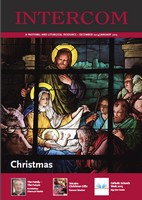 Christmas 2014 issue
Christmas 2014 issue
Click on link to view Intercom Christmas contents
Editorial and Newsletter resources
Feature Article The Family – The Future (pdf)
THE FAMILY – THE FUTURE
Reflection on the Extraordinary Assembly of the Synod of Bishops
Archbishop Diarmuid Martin
I was one of a small group of veterans at the recent Extraordinary General Assembly of the Synod of Bishops on the Family. I was in fact one the very few participants who had been present also at the earlier Synod of Bishops on the family which took place in 1980.
Inevitably for me it was time for comparisons and for reflection of what had happened in the past thirty four years. I found it interesting to reflect that both Pope John Paul and Pope Francis took the family as the theme for their first Synod. Both saw clearly how the Christian family is vital for the transmission of the faith and for the stability of society. Both saw the need not just to defend, but to foster the Christian vision of the family and to present that vision in an appealing way in the real situations of today’s changing world.
There was a strong recognition that the Church’s teaching on marriage and the family is not easily understood in today’s world, especially by young people. In today’s culture many of the classical terms regarding marriage and the family have taken on a different meaning in secular society.
The strong message of the Synod was a call for a radical renewal of the Church’s pastoral support for marriage and the family. Marriage preparation is not just a canonical requirement for a Church wedding. It must be understood as part of a life-long catechesis or itinerary of faith about the Sacrament of Marriage. It was stressed that marriage preparation and the accompaniment of marriage belongs within the work of parishes and the day to day life work of evangelisation and cannot be outsourced. This has particular implications for Ireland.
With over 190 Synodal Fathers from so many countries in the world it was inevitable that concerns would be different. The challenges which the Church faces in supporting families are different in different parts of the world.
The Synod’s analysis was very realistic. The perfect family rarely exists. All over the world families struggle. Families struggle due to poverty, unemployment and marginalisation. In many parts of the world families are struck by wide-scale emigration and the separation that this entails. In my discussion group there was a married couple from Iraq who spoke movingly of the struggle that families in that region face being driven from their homes if they do not accept to renounce their Christian identity.
At the 1980 Synod there was reference to secularisation and a changing understanding of family in Western societies. Over the past thirty four years that challenge has become worldwide. Right across the world the number of Catholics who are only civilly married or who cohabit is increasing. At times this is due to a different anthropology; at times it is due to a lack of awareness of the attractiveness of the Christian vision of marriage; at times it is due to harsh economic and social conditions. Permanence in human relations is difficult today. Marriages fail.
The tone which Pope Francis wished to give the Synod was never condemnatory. The Church must listen to where God is speaking through the witness of those Christian married couples who struggle and fail and begin again. The tone was one of reaching out pastorally and of reflecting the mercy of Jesus. One Bishop took up Pope Francis’ image of the Church as a ‘field-hospital’ where wounds are healed, saying that the Synod must avoid giving the impression that the Church is more like a mortuary analysing all the pathologies of the family.
It is inevitable that in reporting a major Church event like the recent Synod certain issues would be given particular attention and become what I called the ‘celebrity issues’. In the case of the Synod the celebrity issues were the possible admission of divorced and civilly remarried Catholics to Holy Communion and the pastoral response to people of homosexual orientation. The Synod did dedicate much of its time to these questions. There was also a vast amount of extra-Synodal reflection and even polemics around the issues. Both matters require further reflection.
Pope Francis wanted openness at the Synod and he trusted those present at the synod to take the discussions as far as they could and in all honesty. The Synod’s final Report is addressed to the Bishops’ Conferences of the World. The biggest challenge remains; how in today’s complex cultural situation can the Church open a dialogue with men and women and young people where they are and lead them to a deeper idea of the Christian understanding of marriage. This will surely involve a radical rethinking of the Church’s pastoral care for marriage and catechesis among young people, in the year before the upcoming Ordinary Synod in 2015.
Intercom
Intercom is a pastoral and liturgical resource magazine published by Veritas, an agency of the Irish Catholic Bishops Commission on Communications.
There are ten issues per year, including double issues for July-August and December-January.
For information on subscribing to Intercom, please contact Ross Delmar (Membership Secretary):
Tel: +353 (0)1 878 8177 Email: [email protected]

